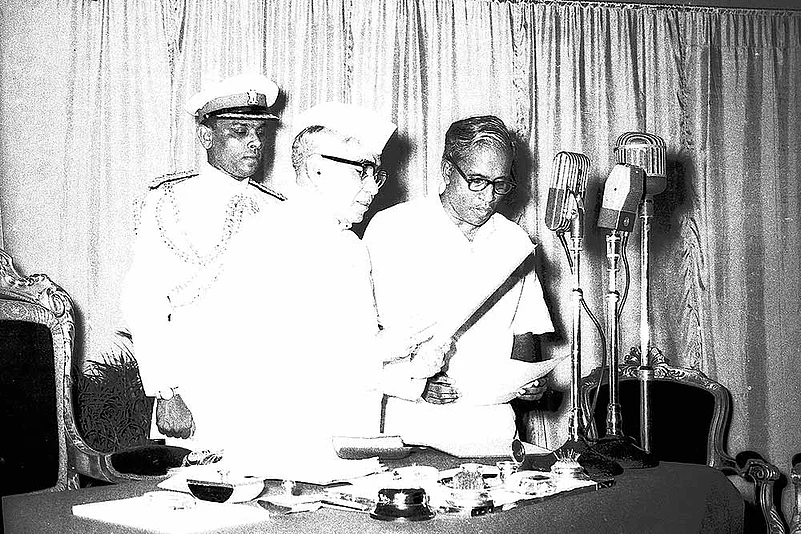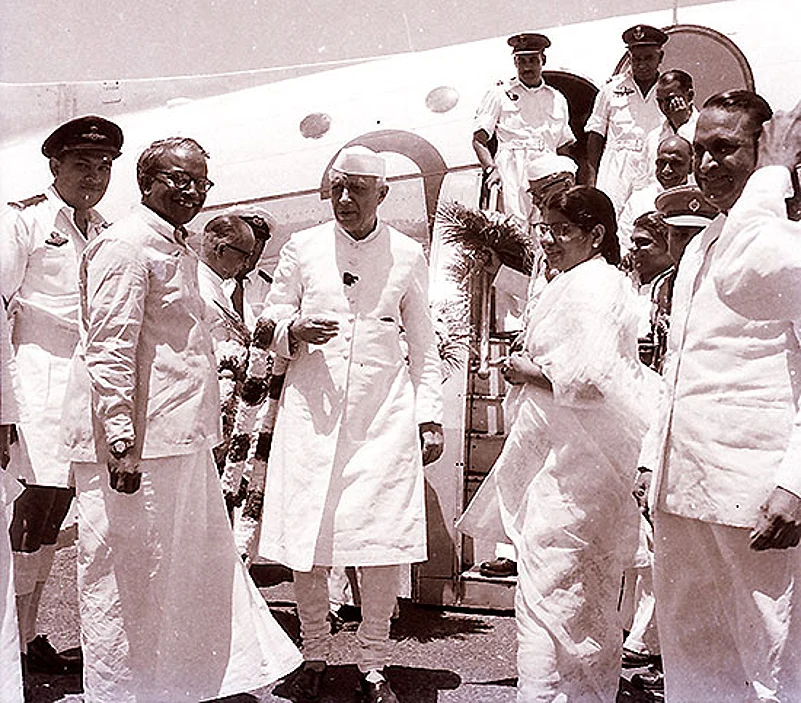Sonic Boom
- Seventy years ago, Chuck Yeager, a USAF pilot and World War II veteran, became the first person to break the sound barrier. He was test-flying the Bell X- 1 experimental rocket plane over Rogers Dry lake in California. He flew the plane just over Mach 1 at an altitude of over 40,000 feet.
***
Sixty years ago, in April 1957 to be precise, the first Communist ministry was formed in Kerala. The Communist Party, along with independents supported by it, won 65 out of 126 seats in the assembly election. This was an event that attracted worldwide attention since it was the first time a Communist party had won a majority in a parliamentary system to form a government.
Advertisement
There was an earlier precedent of a Communist party being elected to government before Kerala—that was in the Republic of San Marino in 1945. But San Marino is a tiny, independent enclave in north-eastern Italy, with a population of less than 30,000 at that time. Moreover, it was a coalition government of the Communist Party and the Socialist Party.

E.M.S. Namboodiripad takes oath as Kerala CM on April 5, 1957
When E.M.S. Namboodiripad took oath of office as chief minister on April 5, 1957, it set in motion a progressive government, the like of which has not been seen since. Between April 5, 1957, and July 31, 1959, when the government was dismissed, the measures taken by it had a far-reaching impact on both Kerala and national politics. The first Communist ministry put forth an agenda, based on what the Communist Party saw as the steps necessary for advancing the democratic revolution. That is, completion of the anti-feudal tasks and laying the foundations of a socially just and democratic society.
Advertisement
During this short period of 28 months, the EMS ministry took pioneering steps for land reforms; enhancing minimum wages and initiating welfare measures for the working people; democratising the educational system; and putting in place a pro-people police policy.

EMS, chief minister in Kerala’s first Left government, welcomes the then prime minister Jawaharlal Nehru at Trivandrum airport
Pioneering Land Reforms
The first step taken by the ministry was an ordinance to stop evictions of tenants. This was followed by the agrarian reform bill. The Agrarian Relations Bill was the most important piece of legislation introduced by the EMS government. It was adopted by the Kerala assembly after intense discussions in June 1959. Before it could get presidential assent, the government was dismissed.
The Agrarian Relations Bill was not a piece of legislation conceived out of a revolutionary agenda. It was very much within the framework of what the Congress had promised the peasantry before independence. The modest reforms called for fixed tenure for tenants, reduction in the rent, ensuring the right of tenants and making cultivators owners of the land by paying compensation to the landlords. The Bill further set 15 acres of double crop land as the ceiling of land ownership. This essentially democratic agrarian reform evoked strong opposition from the bourgeois-landlord classes.
The other legislation that incurred bitter opposition was the education bill. This sought to regulate the appointments and terms of employment of teachers. The salaries of teachers were to be paid through the treasury. There was a provision for takeover of the management of educational institutions that violated the law. There was no proposal whatsoever for state takeover of private educational institutions. Yet, the Catholic Church declared war on the government, joined by caste and communal organisations that had a vested interest in education.
Advertisement

A memorial to the Punnapra-Vayalar uprising of 1946 in the princely state of Travancore
That first EMS ministry’s experience underlined what the Communists had said at the time of independence. The bourgeoisie, because of their compromise with landlordism and feudal interests, had abandoned carrying forward the tasks of the democratic revolution. If the whole gamut of legislations and measures taken by the first Communist ministry are evaluated, they were not, in any sense, socialistic in nature. They were democratic reforms governed by the Communist party’s vision of how to carry forward the democratic transformation of society—a task left unfulfilled with the acquiring of independence.
Advertisement
New Police Policy
The EMS ministry pioneered a new democratic policy for the police. It declared that the police would not be used as an instrument of oppression of the working people who wage legitimate struggles for their rights. The police would not play their traditional role of coming to the aid of the capitalists and landlords to suppress the struggles of the working people. This also incurred the charge that the Communists were paralysing the police and replacing them with their “cadre raj”. As EMS explained, “The crux of that policy is that it is not the job of the police to suppress the trade union, peasant and other mass activities of any mass organisation, or a political struggle waged by any political party; it is the job of the police to track down and punish those who commit ordinary crimes.” The police policy adopted by the EMS ministry became the model for the subsequent Left-led governments. The United Front governments of West Bengal in 1967 and 1969 proclaimed this policy when Jyoti Basu was the home minister. There too, it caused consternation among the bourgeois-landlord classes.
Advertisement
Welfare of Working People
The first Communist ministry established by its record that it is possible for a state government to implement measures to improve the living conditions of the working classes, even if in a limited way. The Minimum Wages Act for workers in 18 industries and for agricultural workers ensured a substantial increase in the wages of the working class, the Agriculturist’s Debt Relief Act provided substantial relief to the peasantry against rapacious moneylenders and the Maternity Benefit Act gave women their long-deserved rights. The National and Festival Holidays Act provided for seven paid holidays, including May Day. These and the setting up of welfare boards created the basis for a welfare state, which made Kerala unique in the provision of minimum wages, education and health facilities. This experience showed that within the limitations of the existing constitutional set-up, a state government with even limited powers can work for the welfare of the working people.
Advertisement
Decentralisation
When we look back at the performance of the first Communist ministry in Kerala, one is struck by how far-reaching its policies were. Even though many of the bills introduced by the government in the legislature could not be adopted, the policies they set out became the guide for future action. For instance, the Panchayat Bill and the District Council Bill set out for the first time the task of decentralisation of powers. These too met with opposition. However, what was initiated by the first Communist ministry was taken up by subsequent Left-led governments, which strengthened the panchayati raj system in Kerala. The EMS ministry also took up the issue of administrative reforms seriously. Democratisation of the administration and accountability of the administrative system have still proved illusory in the country.
Advertisement
The EMS government sought to seriously tackle the problem of food deficit in the state. It formulated the setting up of people’s food committees, comprising representatives of the people, which would supervise the public distribution system. This was attacked by the opposition as a means to raise funds for the Communist Party.
“Overthrow Communist Ministry”
The Communist government’s measures, particularly the Agrarian Relations Bill and the Education Bill, evoked virulent opposition from caste and communal forces. The Catholic Church and the Nair Service Society were joined by the Congress and the PSP to launch a vimochana samaram (liberation struggle). It was initially directed against the Education Bill, the Agrarian Bill and reservations, but in the second phase, the aim of the struggle became to overthrow the government itself.
Advertisement
The anti-Communist combine represented the ferocious face of the class struggle against the workers, peasants and the working people who supported the Communist government. Violence was unleashed on a large scale. Special targets for attack were government schools, cooperative-run toddy shops, state transport buses—all that affected the vested interests. In 1959 began the tactic of attacking the police to provoke police firings. The deaths in such firing were then utilised to inflame sentiments and create the grounds for alleging a “breakdown of law and order”, necessitating central intervention.

Cabinet members in the first council of ministers led by E.M.S. Namboodiripad
Advertisement
Misuse of Article 356
The manner in which Article 356 was invoked for the dismissal of the ministry in July 1959 became an unhealthy precedent. Since the report of the governor was to come only a day later by air service via Madras, the Intelligence Bureau was asked to get the report from the plane in Madras and communicate the contents by telephone to New Delhi. The entire report was dictated over the telephone. It was this report that was then used for the proclamation of President’s rule. The way the governor’s report was received and used became the undemocratic pattern for successive governments at the Centre. It is after this experience that the struggle to stop the misuse of Article 356 became an important demand of the democratic forces in the country.
Advertisement
CIA Funds
The coming into being of the first elected Communist government in the world had also drawn the attention of US imperialism, which had embarked on a cold war against world communism. The US secretary of state, John Foster Dulles, said at a press conference in September 1957: “Local election victories by Communists in India and Indonesia are a dangerous trend. It is a dangerous trend whenever Communists move towards political control.”
Subsequently, the local antagonisms that led up to the so-called liberation struggle against Communist rule found ready support from the US. That the US provided funds to the Congress leadership for the struggle to topple the Communist ministry was confirmed later. A later American ambassador to India, Daniel Patrick Moynihan, in his memoir A Dangerous Place, confirmed that the CIA gave money to the Congress leadership on two occasions to fight the Communists—the first time for Kerala during the first Communist ministry and a second time in the 1960s for West Bengal.
Advertisement

(clockwise from top left) K.R. Gowri Amma, revenue minister in the first EMS government; A.K. Gopalan, leader of the Opposition in the first Lok Sabha, 1952 and later one of the CPI(M)’s founders; Joseph Mundassery, education minister under EMS, 1957-59
Pathbreaking Role
In Kerala, the subsequent Left-led governments that were elected sought to carry forward the programmes and vision of the first Communist ministry. In other states where Left-led governments were established—West Bengal and Tripura—the task of implementing land reforms and democratic decentralisation were taken forward. The first Communist ministry could not complete its full term, but its 28-month existence unleashed the powerful currents of agrarian reform and democratic transformation, the impact of which is still felt in our country today.
Advertisement
Six decades later, a progressive agenda for the country as well as a Left and democratic alternative has to necessarily draw upon the wellsprings of this remarkable government. To pursue this endeavour is all the more essential in the times we live in, when the right-wing offensive is in full swing.
Prakash Karat is a politburo member and former general secretary of the CPI(M)




















